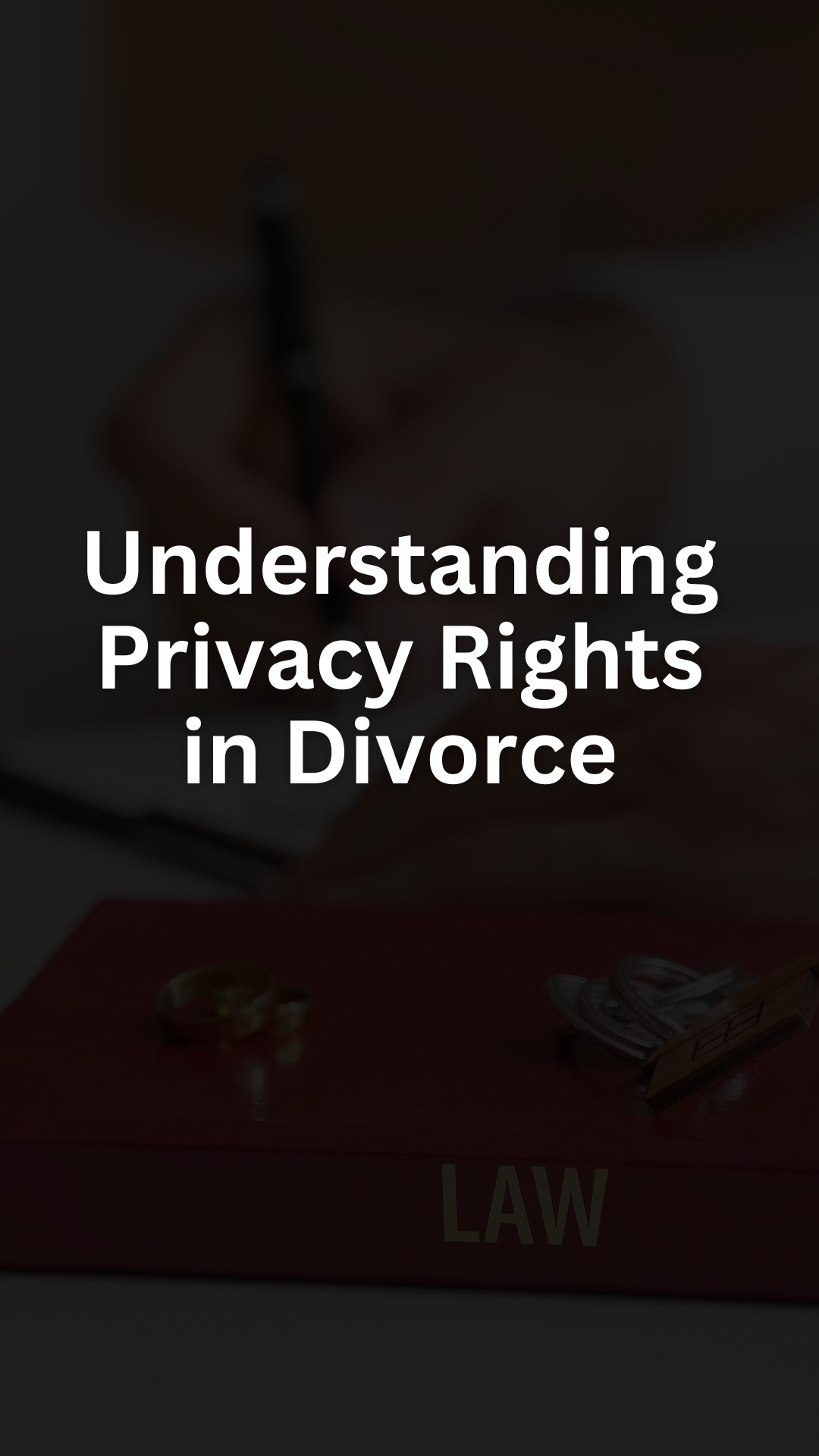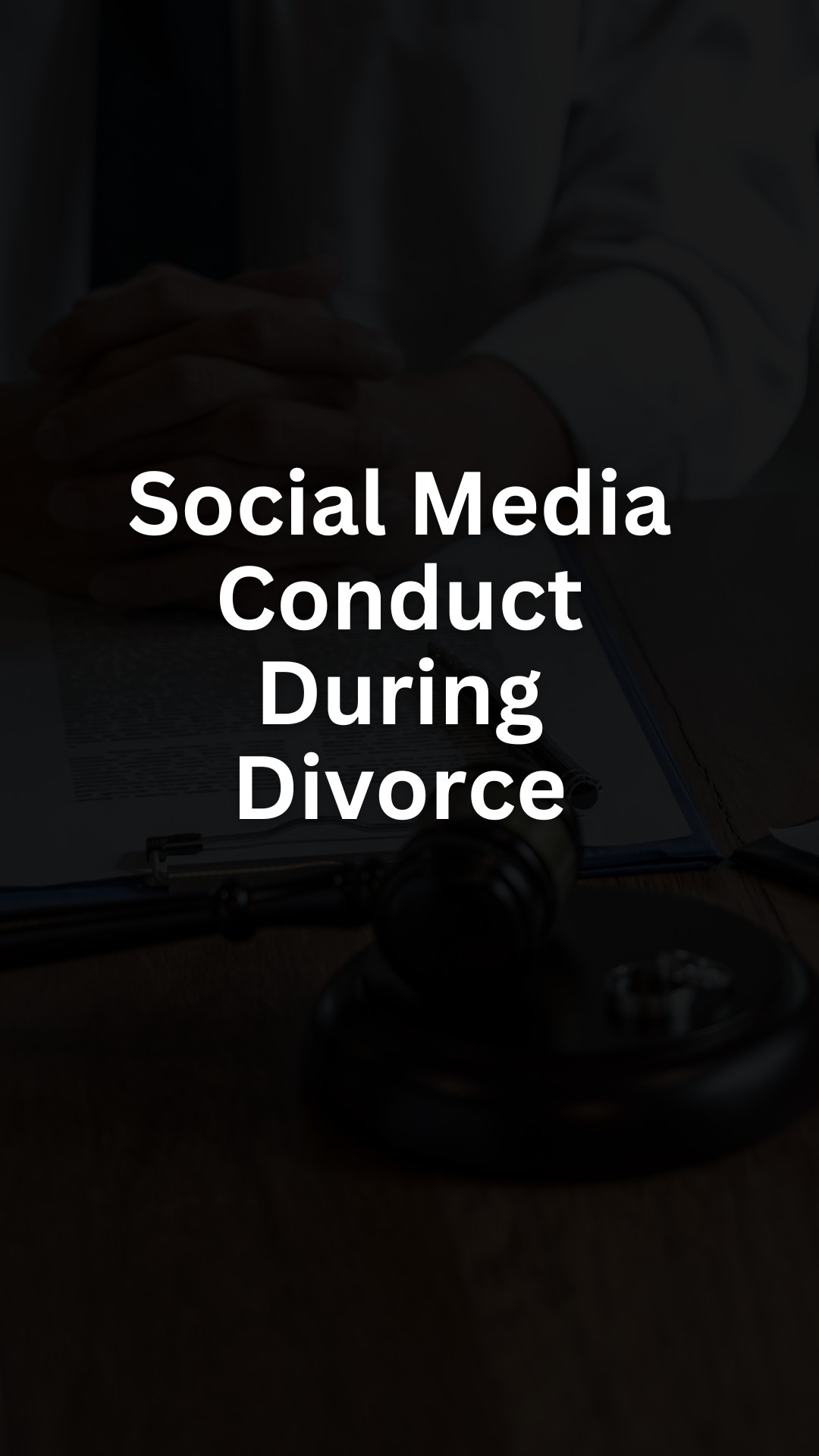Going through a divorce is tough, and protecting your privacy during this time is crucial.
You might not realize it, but many personal details can become public during a divorce. To keep your information safe, be careful about what you share online and who you talk to about your situation.
When you’re in the middle of a divorce, it’s easy to forget about digital privacy.
Change your passwords and make sure your emails and social media accounts are secure. Being proactive can prevent unwanted access to your personal data.
It’s also smart to limit conversations about your divorce to trusted friends and family.
Loose talk can spread quickly and harm your case or personal life. Think before sharing details, even when you’re frustrated or upset.
Understanding Privacy Rights in Divorce

Divorce can be a stressful time, and keeping your privacy intact is crucial.
During divorce proceedings, your personal information can be exposed. This includes financial details, property records, and even private conversations.
Key Privacy Rights:
- Confidentiality of Records: Request that sensitive court records be sealed.
- Data Protection: Safeguard digital devices and change passwords regularly.
- Attorney-Client Privilege: Share sensitive information only with your lawyer.
Steps to Take:
- Limit Social Media Use: Avoid sharing personal updates online.
- Secure Documents: Store documents in a safe place.
- Monitor Communication: Be careful with emails and texts.
Securing Personal Documents and Information

During a divorce, it’s crucial to protect your personal documents and information. This ensures your privacy and prevents misuse of your data. Here’s what you need to know:
Inventory of Personal Documents
Start by creating a list of all your important documents. This includes:
- Birth certificates
- Social security cards
- Marriage licenses
- Bank statements
- Insurance policies
- Property deeds
Keep a detailed record of where each document is stored. You might use a spreadsheet or a simple list on paper. It helps to know where everything is if you need it quickly.
Also, make copies of the most important documents and store them in a separate, secure location.
Safeguarding Electronic Data
Protecting your electronic data is just as important as securing physical documents.
Start by changing passwords to your email, social media, and online banking accounts.
Use strong, unique passwords for each account.
Consider using two-factor authentication where possible. This adds an extra layer of security.
Backup important files to an external hard drive or a secure cloud service.
Ensure that your devices have up-to-date antivirus software to prevent malware attacks.
Handling Physical Documents
Store your physical documents in a safe place. A locked filing cabinet or a fireproof safe can offer extra protection.
If you need to transport documents, use an envelope or a secure folder to keep them together and prevent loss.
If you have sensitive documents, avoid leaving them in places where others might access them, such as your car or a shared desk.
Shred any unnecessary documents that contain personal information before throwing them away to prevent identity theft.
Managing Shared Digital Assets

When going through a divorce, managing digital assets like social media accounts, joint email accounts, and shared cloud storage is crucial. Protecting your privacy involves careful steps to ensure that all shared digital information is handled securely.
Social Media Accounts
Start by changing passwords for your personal social media accounts.
Make sure to use strong passwords that contain a mix of letters, numbers, and symbols.
It’s important to review your privacy settings and update them to restrict who can see your posts and personal information.
Consider removing or untagging yourself from photos and posts that involve your ex-partner.
Also, be cautious about posting anything related to the divorce process or your personal feelings.
Social media activity can be used in legal proceedings, so it’s best to stay neutral and private.
You may also want to create a list of any mutual friends or contacts from whom you wish to distance yourself during this time. Blocking or unfriending certain individuals can help maintain your privacy.
Joint Email Accounts
If you have any joint email accounts, discuss with your ex-partner the best way to handle them.
This might involve closing the account or dividing the contents into separate accounts.
Be sure to forward important emails to your personal email before making any changes.
Change the passwords immediately for any joint accounts that were primarily yours or are necessary for your personal use.
Then update your personal email address for any services or subscriptions linked to the joint email account.
Take steps to secure your personal email accounts by enabling two-factor authentication (2FA) where possible. This adds an extra layer of security, making it harder for unauthorized access.
Shared Cloud Storage
Review the contents of any shared cloud storage accounts like Google Drive, Dropbox, or iCloud.
Make a list of the important documents, photos, and files you need to save, and transfer them to your private storage.
Once you have secured your files, discuss with your ex how to handle the shared account.
This might involve creating separate folders or migrating content to individual accounts.
Ensure that you remove any sensitive or personal information before relinquishing access.
It’s also wise to change the passwords and check sharing permissions for these accounts to prevent unauthorized access.
Separation of Financial Matters

During a divorce, it is important to handle financial matters carefully. This involves dealing with joint bank accounts, credit cards, loans, and personal investments.
Joint Bank Accounts
Close any joint bank accounts as soon as possible. This helps to prevent your spouse from withdrawing all the money or running up debts.
Open a new account in your name only and transfer direct deposits and automatic payments to your new account.
Make a list of all accounts, including checking and savings accounts. Know the balance and account numbers.
If you own a business, keep a clear record of business accounts separate from personal accounts.
Credit Cards and Loans
Separate your finances by addressing all joint credit cards and loans.
Cancel any joint credit cards and apply for your own. Remove your spouse’s name from any future credit applications.
Monitor your credit report frequently to ensure no new joint debt is added without your knowledge.
Contact your lenders to inform them of your separation.
This step can protect you from being held responsible for debts your spouse incurs after separation.
Work with your spouse to pay off or divide any remaining balances.
Personal Investments
Identify all your personal investments such as stocks, bonds, retirement accounts, and real estate.
Determine the current value of these investments and decide how they will be divided.
Consult a financial advisor to understand the tax implications and long-term effects of dividing investments.
Transfer ownership of investments where necessary, ensuring all documents and titles reflect the new ownership.
In some cases, you might need to cash out certain investments, while others can be divided without liquidation.
Make sure to update beneficiary information on all accounts to reflect your new status.
Changing Passwords and Updating Security

It’s important to change your passwords when going through a divorce. Start with your online accounts like email, social media, and banking.
Create strong passwords that include a mix of letters, numbers, and symbols. Use password managers to keep track of them.
Consider these steps:
- List all your accounts.
- Update each password.
- Use unique passwords for different accounts.
Enable two-factor authentication (2FA) for extra security. This adds another layer of protection.
Tip: Notify trusted contacts about your new email or phone number. This keeps communication secure.
Stay alert for unusual activity or login attempts. Review your security settings often.
Protecting Against Identity Theft

Divorce can make you more vulnerable to identity theft. Protecting your personal information is crucial.
Monitor Your Credit Reports
Regularly check your credit reports. You are entitled to one free report from each of the three major bureaus every year.
Look for unfamiliar accounts or inquiries.
Secure Important Documents
Keep documents like your Social Security card, birth certificate, and financial records in a safe place.
Consider using a locking file cabinet or a safe.
Change Your Passwords
Update passwords for online accounts.
Use strong, unique passwords for each site. Avoid using easily guessed passwords like your birthday or pet’s name.
Set Up Fraud Alerts
Contact your bank and credit card companies to set up fraud alerts. This way, you will be notified of any suspicious activity.
Use Two-Factor Authentication
Whenever possible, enable two-factor authentication for your accounts. This adds an extra layer of security by requiring a second form of verification.
Be Cautious with Personal Information
Be careful about sharing personal information. Only provide details when absolutely necessary and make sure the request is legitimate.
Destroy Unneeded Documents
Shred old bank statements, credit card bills, and other sensitive paperwork. Simply throwing them away can leave you vulnerable.
Dealing with Shared Properties

During a divorce, figuring out what to do with shared properties like homes or real estate investments can be complex. Different options for dividing these assets include selling the property, continuing shared ownership, or one spouse buying out the other’s share.
Real Estate Holdings
Deciding what to do with shared real estate should start with an accurate assessment.
Hiring a professional appraiser ensures you get a fair market value for the property.
Next, consider legal and tax implications.
For instance, selling the property may result in capital gains taxes, which you both need to be aware of.
Another option is for one spouse to keep the property by buying out the other’s share.
This requires refinancing the mortgage and transferring the deed, often involving legal procedures. Consulting a lawyer can provide clarity on this process.
Lastly, you can choose to keep shared ownership temporarily.
This might be suitable if you are waiting for the market to improve before selling, but it requires a clear agreement on expenses and responsibilities.
Discussing Privacy with Legal Counsel

When you talk to your lawyer about privacy during your divorce, be honest. Share your concerns about keeping personal details confidential.
Your lawyer can help you understand what information must be disclosed and what can stay private.
Key Points to Discuss with Your Lawyer:
- Sensitive Information: Explain which details you consider sensitive, such as financial records or personal emails.
- Communication: Ask how your communications with your lawyer will be kept confidential.
- Public Records: Inquire about what information will become part of the public record.
Your lawyer can offer advice on protecting sensitive data.
Questions to Ask:
- How do you ensure our discussions remain private?
- What steps can we take to protect my financial information?
- Will my case details be accessible to the public?
You might also want to set clear guidelines about electronic communication.
Discuss using secure methods to share documents and information.
Tips for Protecting Privacy:
- Use encrypted email for sensitive messages.
- Avoid discussing private matters over unsecure channels.
Monitoring Your Credit Reports

When going through a divorce, monitoring your credit reports is crucial.
Keep track of your credit history to catch any unfamiliar activities.
Why Monitor Your Credit?
To spot any errors or fraudulent accounts. A spike in debt or new accounts might harm your credit score, making future financial steps harder.
How to Check Your Credit Reports:
- Request Reports: Obtain a free copy from each of the three major credit bureaus: Equifax, Experian, and TransUnion.
- You’re entitled to one free report every 12 months from each bureau.
- Review Carefully: Look for unknown accounts, wrong balances, or incorrect personal information.
- Any irregularities should be noted.
Take Action on Discrepancies:
If you find errors or fraud, contact the credit bureau directly.
Contact Information:
- Equifax: www.equifax.com
- Experian: www.experian.com
- TransUnion: www.transunion.com
Include a detailed explanation and any supporting documents to resolve the issue quickly.
Set Up Alerts:
Many financial institutions offer text or email alerts.
Set these up to receive notifications about significant changes or new accounts.
Consider a Credit Monitoring Service:
These services can keep an eye on your credit reports for a fee.
They notify you of changes and can offer additional support in the event of fraud.
Social Media Conduct During Divorce

It’s important to monitor your social media activity during a divorce. What you post online can impact your case.
Be mindful and think before you post anything.
Steps to Follow
- Review Privacy Settings: Ensure your accounts are private. Only friends should see your posts.
- Limit Posting: Reduce the number of posts you make. Less activity means less potential for issues.
- Avoid Negative Comments: Refrain from speaking badly about your ex. This can make things more difficult.
Things to Avoid
- No Oversharing: Don’t share details about your divorce online. Keep personal matters private.
- Be Cautious with Photos: Avoid uploading photos that can be misinterpreted or used against you.
- Don’t Discuss Legal Matters: Stay away from talking about court cases or legal strategies.
Handling Harassment and Privacy Breaches

It’s important to stay calm if you face harassment during a divorce. Harassment can be any unwanted behavior that makes you feel unsafe or uncomfortable.
First, document everything. Keep a record of texts, emails, voicemails, or any interaction that feels like harassment. This evidence can help you later.
If you’re being stalked or physically threatened, contact law enforcement immediately. You can also file for a restraining order to protect yourself.
Change your passwords for email, social media, and other important accounts. Use strong, unique passwords to keep your information safe.
Consider using a virtual private network (VPN) when browsing online. This helps keep your internet activity private and secure.
Limit what you share on social media. Think twice before posting personal details like your location, plans, or feelings about the divorce.
If you suspect your ex-partner has access to your devices, scan for spyware or malware. Many free and paid tools are available that can help with this.
Contact an attorney who specializes in family law. They can provide guidance and support on how to handle harassment and protect your privacy.
Finally, consider therapy or counseling. Talking to a professional can help you manage stress and emotions during this challenging time.
Frequently Asked Questions

Learn how to protect your privacy during a divorce with practical steps to secure your personal information, digital privacy, credit, and assets.
What steps can be taken to secure personal information when filing for divorce?
Make copies of important documents and store them in a safe place. Update your mailing address to a secure location. Notify the necessary institutions about the change in your marital status.
How can I maintain digital privacy from my spouse during a divorce proceeding?
Change passwords for all online accounts. Create new email accounts for sensitive communication. Use secure devices and avoid shared computers for private matters.
What measures should I take to protect my credit and prevent unwanted financial liabilities during my divorce?
Monitor your credit report regularly. Close joint accounts and open individual ones. Place a credit freeze if needed to prevent unauthorized access.
How can I ensure confidentiality when discussing the terms of my divorce with legal counsel?
Use secure communication methods like encrypted emails or secure phone lines. Meet your lawyer in private settings. Keep physical documents confidential and locked away.
What precautions can be taken to safeguard my assets before filing for divorce?
Make a list of all assets and their values. Secure valuables in a safe deposit box. Avoid making large financial changes without legal advice.
How do I manage shared accounts and passwords to prevent privacy breaches while separating from my spouse?
Close or limit access to shared accounts immediately.
Update passwords and security questions regularly.
Inform your bank and service providers about the separation.